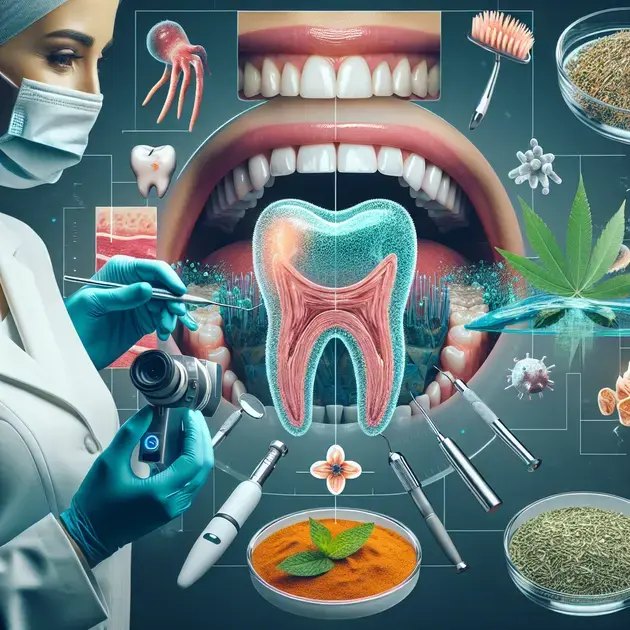When it comes to tackling Periodontitis, finding an effective medication is crucial for successful treatment. In this comprehensive guide, we will explore the various treatment options available for managing this common dental condition.
Periodontitis, also known as gum disease, affects a large percentage of the population and can lead to serious oral health issues if left untreated. By understanding the different medications and therapies available, patients can take proactive steps towards improving their oral health and overall well-being.

Effective Treatment Options for Periodontitis
When it comes to treating periodontitis, there are several effective options available that aim to control the infection, reduce inflammation, and prevent further damage to the gums and teeth. One common treatment is scaling and root planing, a deep cleaning procedure that removes plaque and tartar from below the gumline. This helps to eliminate bacteria and smooth out the roots of the teeth to promote healing.
Another treatment option for periodontitis is the use of antibiotics, either in pill form or as a mouth rinse. These medications can help to reduce bacterial infection and inflammation in the gums. In more advanced cases, surgical interventions such as flap surgery or bone and tissue grafts may be necessary to repair and regenerate damaged gum and bone tissue.
For individuals looking for alternative or adjunctive treatments, laser therapy has shown promising results in targeting and killing bacteria that cause gum disease while promoting tissue regeneration. Additionally, incorporating probiotics into your oral hygiene routine can help maintain a healthy balance of bacteria in the mouth, potentially reducing the risk of developing periodontitis.
It’s important to consult with a dental professional to determine the most suitable treatment option based on the severity of your condition. Websites like WebMD and the American Dental Association offer comprehensive information on periodontal treatments, including tips on finding a qualified periodontist in your area.
Understanding Gum Disease and Its Implications
Gum disease, also known as periodontal disease, is a common condition that affects the tissues surrounding the teeth. It is primarily caused by the accumulation of plaque and tartar on the teeth, leading to inflammation and infection of the gums. If left untreated, gum disease can progress to periodontitis, a more severe form of the condition that can result in tooth loss and other serious health complications.
Some of the key signs and symptoms of gum disease include red, swollen, or bleeding gums, persistent bad breath, and loose or shifting teeth. It’s essential to recognize these early warning signs and seek prompt treatment to prevent the condition from worsening.
Regular dental check-ups and professional cleanings are crucial for detecting and addressing gum disease in its early stages. Brushing and flossing daily, as well as using antiseptic mouthwash, can help remove plaque and bacteria from the teeth and gums, reducing the risk of developing gum disease.
Educational resources like the Mayo Clinic and the National Institute of Dental and Craniofacial Research provide valuable insights into the causes and implications of gum disease, offering guidance on preventive measures and treatment options to maintain optimal oral health.
Proactive Steps for Managing Periodontitis
Managing periodontitis involves a proactive approach to controlling the infection and maintaining the health of the gums and teeth. One essential step in managing the condition is to practice good oral hygiene habits, including brushing your teeth at least twice a day with a fluoride toothpaste and flossing daily to remove plaque and food debris.
In addition to regular oral hygiene practices, incorporating a balanced diet rich in nutrients and vitamins can support gum health and overall immune function. Avoiding tobacco products and limiting sugary foods and beverages can also help reduce the risk of gum disease progression.
Regular visits to a periodontist for professional cleanings and check-ups are essential for monitoring the progress of the condition and addressing any concerns promptly. Your periodontist may recommend additional treatments such as antimicrobial mouth rinses or prescription medications to control bacterial growth and inflammation in the gums.
Online platforms like Colgate and the Centers for Disease Control and Prevention offer resources on periodontitis management, including tips on lifestyle changes and treatment options to help individuals take proactive steps towards improving their gum health.

Understanding the Progression of Gum Disease
Gum disease, also known as periodontal disease, is a common dental issue characterized by inflammation and infection of the gums. It typically starts with gingivitis, a mild form of gum disease that causes redness, swelling, and bleeding of the gums. If left untreated, gingivitis can progress to periodontitis, a more severe form of gum disease that can lead to tooth loss.
One of the main causes of gum disease is the buildup of plaque, a sticky film of bacteria that forms on the teeth. Plaque can harden into tartar, which can only be removed by a professional dental cleaning. Poor oral hygiene, smoking, genetic predisposition, and certain medical conditions can also increase the risk of developing gum disease.
It is essential to diagnose and treat gum disease early to prevent further progression. Regular dental check-ups, professional cleanings, and proper oral hygiene practices, such as brushing twice a day and flossing daily, can help maintain healthy gums and prevent gum disease.
In advanced stages of gum disease, treatments may include deep cleanings, antibiotics, gum surgery, and other procedures to restore gum health. Severe cases of gum disease may require collaboration between dentists and periodontists to develop a comprehensive treatment plan.
By understanding the progression of gum disease and taking proactive measures to maintain oral health, individuals can prevent the complications associated with advanced gum disease and preserve their natural teeth for a lifetime.
Holistic Approaches to Managing Periodontitis
Periodontitis is a chronic inflammatory condition that affects the gums and supporting structures of the teeth. Conventional treatments for periodontitis typically involve antibiotics, scaling and root planing, and surgery. However, holistic approaches to managing periodontitis focus on addressing the root causes of gum disease and promoting overall health and well-being.
One holistic approach to managing periodontitis is through proper nutrition and supplementation. A diet rich in vitamins, minerals, and antioxidants can support the immune system and reduce inflammation in the gums. Supplements such as vitamin C, coenzyme Q10, and probiotics have been shown to promote gum health and support periodontal therapy.
In addition to nutrition, stress management techniques such as yoga, meditation, and acupuncture can help reduce stress levels and improve immune function, which can have a positive impact on gum health. Holistic dentistry practices, such as ozone therapy and laser therapy, can also be used to treat periodontitis and promote gum tissue regeneration.
Overall, holistic approaches to managing periodontitis emphasize a whole-body approach to oral health, focusing on lifestyle factors, nutrition, stress management, and natural therapies to support gum health and prevent the progression of periodontal disease.
Exploring Novel Treatment Approaches for Periodontitis
As research continues to advance in the field of periodontics, novel treatment approaches for periodontitis are being explored to improve outcomes and provide more effective solutions for managing gum disease. One promising novel treatment approach is the use of stem cell therapy to regenerate damaged gum tissue and promote periodontal tissue repair.
Stem cells have the unique ability to differentiate into various cell types, making them a promising tool for regenerating tissues damaged by periodontitis. By harnessing the regenerative potential of stem cells, researchers are seeking to develop personalized treatments for periodontitis that can promote gum tissue regeneration and restore oral health.
Other novel treatment approaches for periodontitis include the use of growth factors, peptides, and biomaterials to enhance tissue regeneration and promote healing in the gums. These advanced therapies aim to target the underlying causes of gum disease and stimulate the body’s natural healing processes to resolve periodontal issues.
By exploring novel treatment approaches for periodontitis, researchers and clinicians are striving to revolutionize the field of periodontics and provide patients with innovative and effective treatments for managing gum disease. These advancements hold the potential to transform the way periodontitis is treated and improve the overall outcomes for individuals suffering from this common oral health condition.
Conclusion
In conclusion, understanding the progression of gum disease is crucial for early diagnosis and treatment. Gum disease, starting with gingivitis and potentially progressing to periodontitis, can lead to serious oral health issues if left untreated. Proper oral hygiene practices, regular dental check-ups, and professional cleanings are essential in maintaining healthy gums and preventing gum disease.
Furthermore, holistic approaches to managing periodontitis offer a whole-body perspective on oral health. By focusing on nutrition, stress management, and natural therapies, individuals can support their immune system, reduce inflammation in the gums, and promote overall well-being. Holistic dentistry practices such as ozone therapy and laser therapy provide innovative ways to treat periodontitis and encourage gum tissue regeneration.
Exploring novel treatment approaches for periodontitis, such as stem cell therapy and advanced biomaterials, shows promise in revolutionizing periodontal care. These cutting-edge treatments aim to target the root causes of gum disease, stimulate tissue regeneration, and improve outcomes for individuals with periodontitis. The ongoing research and development in this field hold the potential to transform the way gum disease is managed, offering innovative solutions for better oral health.



